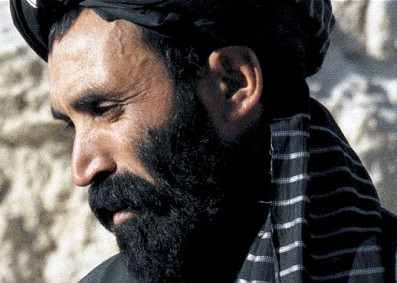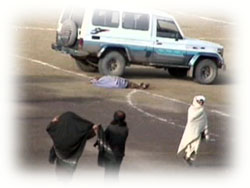Report: Pakistani spy agency rushed Mullah Omar to hospital
The report said Omar was “rushed” to the hospital on Jan. 7 by Pakistan’s Inter-Services Intelligence agency
By Jeff Stein
 |
A rare photograph of Mullah Omar in hiding in 2001. (Photo: Reuters) |
“While
I was not personally in the operating theater,” the physician reported,
“my evaluation based on what I have heard and seeing the patient in the
hospital is that Mullah Omar had a cardiac catheter complication
resulting in either bleeding or a small cerebral vascular incident, or
both.”
U.S. officials said they could not immediately verify the report.
"No
one on this end has heard this," said a U.S. official from Kabul. "It
doesn't mean it's not true -- we just have no information to confirm or
dispute these facts."
A spokesman at the Pakistan Embassy in Washington did not respond to a request for comment.
UPDATE:
On Tuesday afternoon Pakistan's ambassador to the United States, Husain
Haqqani, said the report "had no basis whatsoever."
“Sometimes
intelligence tips received by professionals turn out to be wrong. The
story about Mullah Omar falls under that category. You might recall a
similar story from 2001 about Osama bin Laden receiving dialysis
treatment that turned out to be incorrect, and the fabrication of those
who wanted to give Pakistan a bad name."
Haqqani
added, "Pakistani intelligence, military and law enforcement personnel
continue to hunt down wanted Al-Qaeda and Taliban figures and will
apprehend anyone if and when we have hard intelligence, which is very
different from speculation circulated by contractors.”
The report said Omar was “rushed” to the hospital on Jan. 7 by Pakistan’s Inter-Services Intelligence agency.
“The
ISI rushed him to a hospital in Karachi, where he was given heparin [an
anticoagulant] and operated on,” the Eclipse report said. “After 3-4
days of post-operative care in the hospital, he was released to the ISI
and ordered to take absolute bed rest when at home for at least several
days.”
The
physician who was the source for the report said that, “After the
operation, there seemed to be some brain damage with Mullah Omar having
slurred speech.”
“His
post hospital course is consistent with this type of outcome,” the
physician added. “Three-four days in hospital is consistent with cardiac
catheterization and or cardiac stent placement. Bed rest and aphasia
[difficulty speaking] post-catheterization could be from a bleeding
complication.”
Citing
a separate source in the Quetta shura, the Taliban governing council on
Pakistan’s border with Afghanistan, the Eclipse report said “Mullah
Omar is continuing to improve and his speech is clearing.”
It
also said the ISI was keeping the Quetta shura “informed” about Omar’s
recovery at “an ISI ‘guest house’ in Karachi under ISI guard.”
The
Eclipse Group is run by Duane “Dewey” Clarridge, a former head of the
CIA's Latin American operations who was the first chief of the CIA's
counterterrorism center; Kim Stevens, a retired U.S. diplomat who served
in Bolivia and Italy; and Brad A. Patty, a civilian advisor to the U.S.
Army's 30th Heavy Brigade Combat Team in Iraq from 2007 to 2009.
The Eclipse Group’s reports are available “by invitation only” on its Web site, Stevens said.
By
all appearances, the Eclipse network is the just the latest iteration
of a shadowy, Pentagon-backed operation that began contracting with
former CIA and military operatives to supply intelligence in Afghanistan
and Pakistan in 2009. Amid adverse publicity last year, the Pentagon
supposedly cut off its funding.
Stevens declined to discuss The Eclipse Group’s financing, except to say it has “no DoD clients …”
“Our
customer list is proprietary information, but it is more than 20 and
less than 50, including several European intelligence services,” he
added.
Read more: http://www.rawa.org/temp/runews/2011/01/18/report-pakistani-spy-agency-rushed-mullah-omar-to-hospital.html#ixzz1BvjmYuyN
The question is also who supports the Taliban and Al Qeada how does these groups survive?
 |
| The execution of Zarmeena, a mother of seven children in Kabul by the Taliban in 1999 Saudi Arabia and other Gulf states fund al-Qaeda and Taliban |
Leaked US cables show Saudi Arabia and other Gulf states as key sources for funds for al-Qaeda and Taliban
Saudi
Arabia is a key source of funds for armed groups, including al-Qaeda,
the Afghan Taliban and Pakistan's Lashkar-e-Taiba, according to a leaked
US state department assessment.
In
a series of diplomatic cables spanning several years, published by the
WikiLeaks whistleblowing website on Sunday, the state department details
how such groups continue to seek financing in Saudi Arabia, often
posing as pilgrims visiting the Muslim holy sites.
"Saudi
Arabia remains a critical financial support base for al-Qaeda, the
Taliban, LeT, and other terrorist groups, including Hamas, which
probably raise millions of dollars annually from Saudi sources, often
during Hajj and Ramadan," Hillary Clinton, the US secretary of state,
said in one cable sent in December 2009.
"In
contrast to its increasingly aggressive efforts to disrupt al-Qaeda's
access to funding from Saudi sources, Riyadh has taken only limited
action to disrupt fundraising for the UN 1267-listed Taliban and
LeT-groups that are also aligned with al-Qaeda and focused on
undermining stability in Afghanistan and Pakistan."
'Significant progress'
Pakistan's
army is covertly sponsoring four major militant groups, including the
Afghan Taliban and Mumbai attackers Lashkar-e-Taiba, and "no amount of
money" will change the policy, the US ambassador warned in a frank
critique revealed by the state department cables.
The Guardian, Dec. 1, 2010
The
memo credited the Saudis with "significant progress" under US pressure
to deal with the issue, especially disrupting al-Qaeda's finance
channels.
However,
it said that "Riyadh has taken only limited action" to interrupt the
flow of money to Taliban and LeT-associated groups which have launched
attacks in Afghanistan, Pakistan and India.
In
July 2009, Richard Holbrooke, the US special representative to
Afghanistan and Pakistan, said that the Taliban get more of its funding
from wealthy Gulf donors than from the drug trade for which Afghanistan
has long been famous.
According
to the cable, the annual hajj pilgrimage posed a particular problem for
Saudi authorities attempting to stop the flow of money to armed groups.
"Hajj
was still a big problem for the Saudis, since they could not refuse to
let pilgrims enter the country. Some of the non-Saudi terrorism
detainees in Saudi Arabia had entered as pilgrims," it said.
A
cable sent in August 2009 detailed how Pakistan's Jamaat-ud-Dawah,
which the US accuses of being a front for Lashkar-e-Taiba, raised funds
through "private donations, non-governmental organisations (NGOs),
madrassas, and businesses spread throughout South Asia, the Middle East,
and Europe".
"Some
of JUD's budget, using funds raised both from witting donors and by
fraud, is dedicated to social services or humanitarian relief projects,
while some is used to finance LT operations," it said.
The
cable said that Lashkar-e-Taiba officials were operating front
companies in Saudi Arabia to move funds that could be used to carry out
attacks.
Direct donations
US
officials have also complained of direct donations by wealthy
individuals and a reluctance by governments to monitor charities.
Informal money transfer networks called hawala, or worker remittances, compound the problem.
Kuwait,
another key US ally in the region, comes in for criticism in the memo
sent by Clinton in 2009 for being the sole nation in the six-member Gulf
Co-Operation Council (GCC) that does not have a specific law
criminalising the financing of "terrorist" groups.
"The
GOK [government of Kuwait] at times has obstructed or been slow to
enforce UN-mandated asset freezes of Kuwait-based entities," it said.
Qatar,
which hosts a large US military base, is also singled out for its
"largely passive approach" to co-operating with Washington on tackling
the financing of armed groups.
"Al-Qaeda,
the Taliban, UN-1267 listed LeT, and other terrorist groups exploit
Qatar as a fundraising locale," the state department memo said.
"Although
Qatar's security services have the capability to deal with direct
threats and occasionally have put that capability to use, they have been
hesitant to act against known terrorists out of concern for appearing
to be aligned with the US and provoking reprisals."
UAE 'vulnerable'
United Arab Emirate-based donors were identified as having "provided financial support to a variety of terrorist groups".
"The
point can be emphasised that the UAE's role as a growing global
financial centre, coupled with weak regulatory oversight, makes it
vulnerable to abuse by terrorist financiers and facilitation networks,"
the state department cable said.
In
another cable from December 2009, Howard Mendelsohn, the US treasury
department acting assistant secretary of the office of intelligence and
analysis, stated his belief that the "Taliban and Haqqani Network [a
Pakistan-based group fighting Nato forces in Afghanistan] are believed
to earn money from UAE-based business interests".
"Treasury
analysts provided information on ... two senior Taliban officials who
have made multiple fundraising visits to the UAE, according to US
intelligence," the cable said.
"The UAE security services were not familiar with either individual and asked for additional identifying information."
Read more: http://www.rawa.org/temp/runews/2010/12/06/saudi-arabia-and-other-gulf-states-fund-al-qaeda-and-taliban.html#ixzz1BvkvRRcb


No comments:
Post a Comment